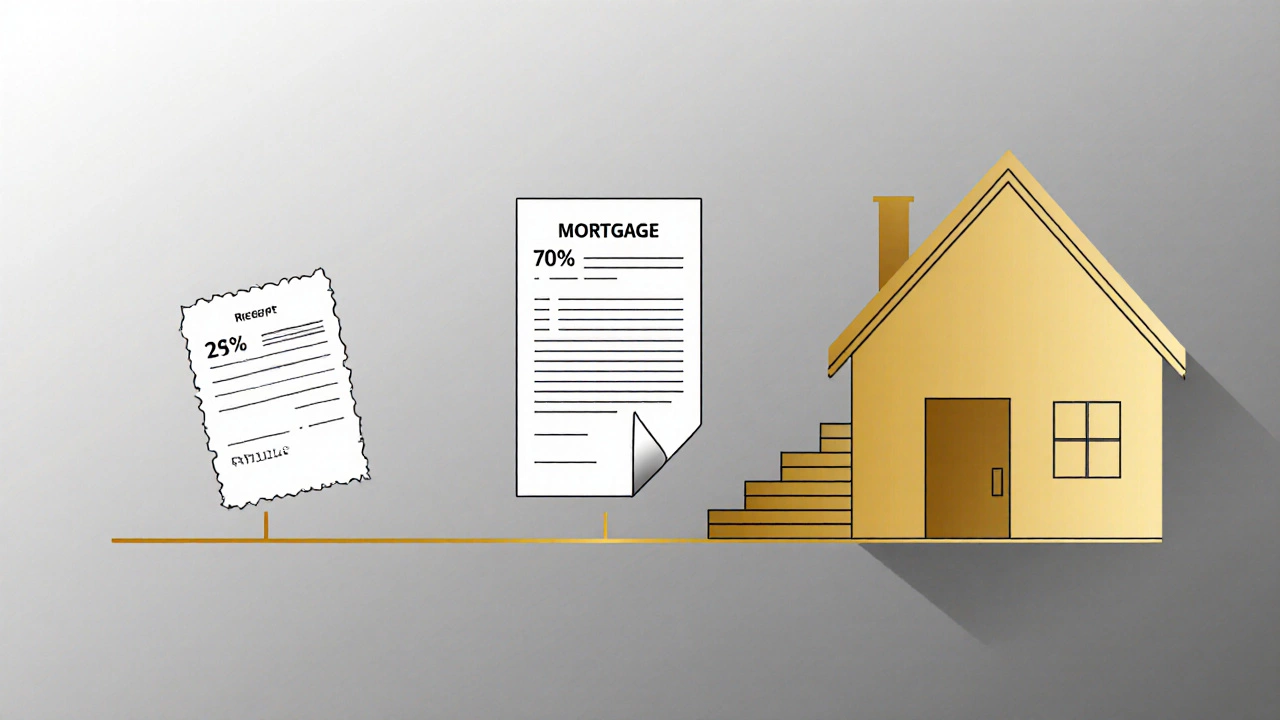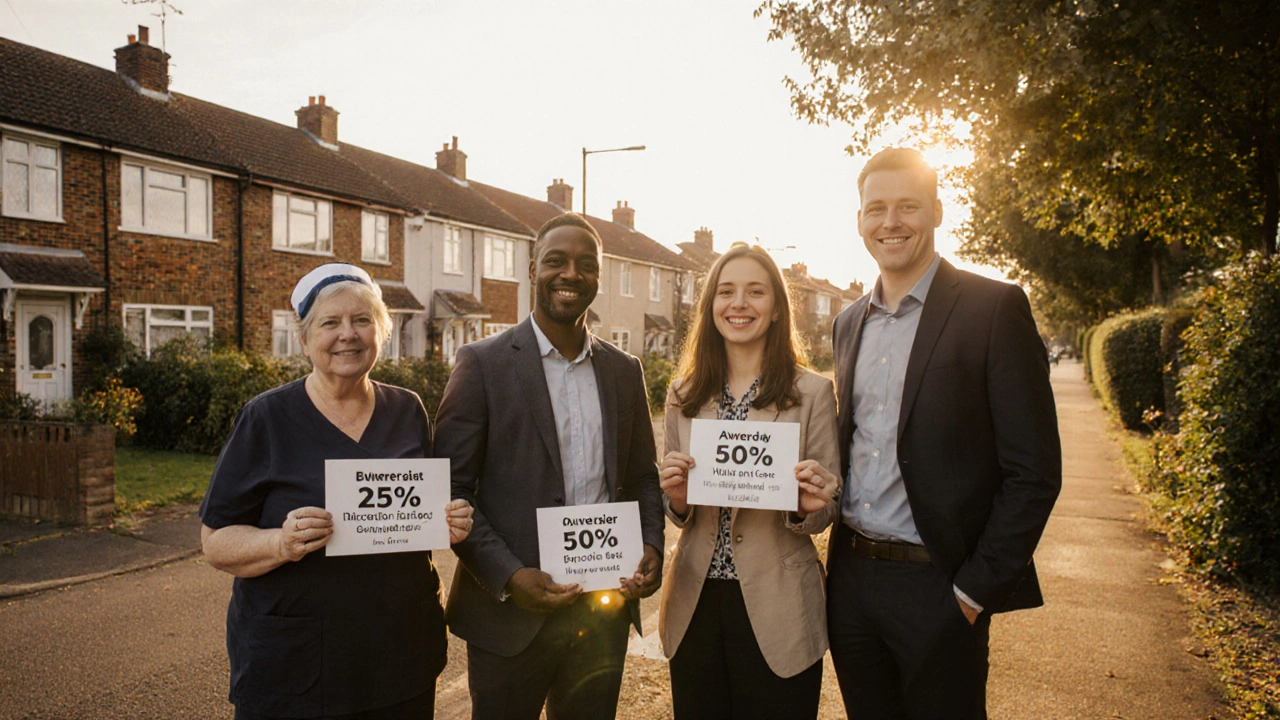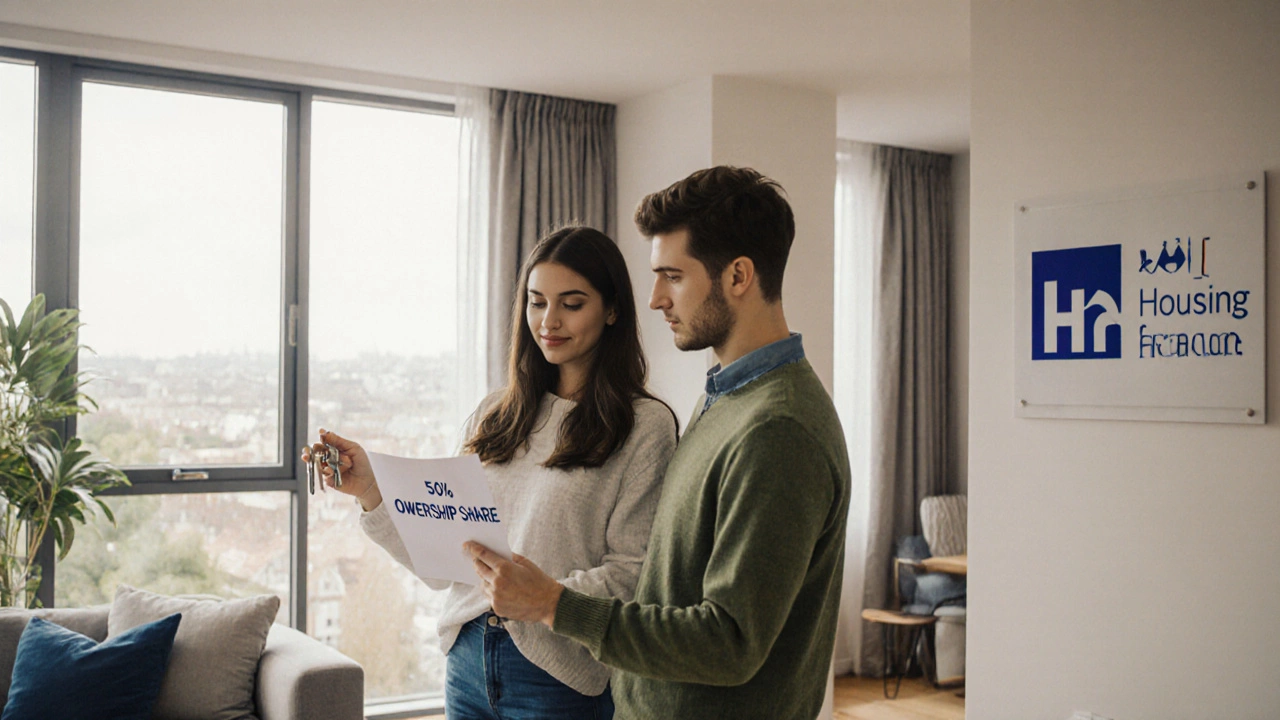Shared Ownership Home Calculator
Calculate Your Costs
Results
Staircasing Impact
Comparison
Shared Ownership vs. Renting vs. Full Ownership
| Feature | Shared Ownership | Renting | Full Ownership |
|---|---|---|---|
| Upfront Cost | £0 | £1,500 | £30,000+ |
| Monthly Cost | £0 | £1,500 | £1,800 |
| Builds Equity? | Yes | No | Yes |
When you hear "shares of ownership," it doesn’t mean you own the whole house. It means you own a piece of it-like owning 25%, 50%, or 75% of a home while a housing association owns the rest. This is the core idea behind shared ownership homes, a government-backed scheme designed to help people who can’t afford to buy a property outright get onto the property ladder.
How Shares of Ownership Work
You buy a share of the property, usually between 25% and 75%, and pay rent on the part you don’t own. For example, if a home is worth £300,000 and you buy a 50% share, you pay £150,000 upfront. You then pay monthly rent on the other 50%, which goes to the housing association. Your mortgage only covers the share you own, so your monthly payments are lower than if you were buying the whole thing.
Most shared ownership homes are leasehold, meaning you have the right to live in the property for a long time-often 99 or 125 years-but you don’t own the land it’s built on. The housing association owns the land and the remaining share of the property.
Why People Choose Shared Ownership
Many people turn to shared ownership because they’re stuck between renting and buying. Renting feels like throwing money away. Buying a home outright feels impossible, especially in cities where average house prices are five or six times the average salary. Shared ownership breaks that barrier.
In 2024, the average deposit needed for a shared ownership home was £12,500-less than half of what’s typically needed for a full purchase. Monthly payments for a 50% share in a £300,000 home averaged £1,100, including mortgage and rent. Compare that to £1,800-£2,200 for a full mortgage on the same property.
It’s not just about cost. It’s about stability. Unlike renting, where your landlord can raise the rent or ask you to leave, shared ownership gives you long-term security. You can stay as long as you want, make improvements, and even sell your share when you’re ready.
Staircasing: Buying More Shares Over Time
One of the biggest perks of shared ownership is staircasing. That’s the fancy term for buying more shares in your home over time. You can buy 10%, 25%, or even 100% more, depending on your finances and the housing association’s rules.
Let’s say you bought a 50% share in a £300,000 home. A year later, your home’s value rises to £320,000. If you want to buy another 25%, you pay 25% of £320,000-that’s £80,000-not £75,000. You’re buying based on the current market value, not what you paid originally.
Most housing associations allow you to staircase up to 100%. Once you own the whole property, you stop paying rent. You still pay service charges and ground rent, but your monthly costs drop significantly. You also become the freeholder in all but name, even if the land is still owned by the association.

What Happens When You Sell?
If you decide to move, you don’t sell the whole house. You sell your share. The housing association has the right to find a buyer first, usually for 8 to 12 weeks. They’ll market your share to other eligible shared ownership buyers. If no one steps up, you can sell on the open market.
You keep all the profit from the increase in value of your share. So if you bought 40% of a £200,000 home for £80,000 and sold it five years later when it’s worth £260,000, your 40% share is now worth £104,000. You walk away with £24,000 in profit-even if you never paid off the full property.
This makes shared ownership a real wealth-building tool. It’s not just affordable housing-it’s an investment.
Who Qualifies for Shared Ownership?
You don’t need to be a first-time buyer, but you do need to meet income and affordability rules. Most schemes require:
- Your household income is under £80,000 a year (or £90,000 in London)
- You can’t currently own a home
- You can afford the mortgage on your share, plus rent and bills
- You have a good credit history
Some schemes are open to people who used to own a home but can’t afford to buy again. Others prioritize key workers like nurses, teachers, or police officers. Rules vary by region and housing association, so it’s worth checking local options.

Downsides and Things to Watch Out For
Shared ownership isn’t perfect. Here are the real pitfalls:
- Rent increases: The rent on your unowned share usually goes up yearly, often tied to inflation. Some associations cap it at CPI +1%, others allow higher hikes.
- Service charges: You pay for building maintenance, cleaning, and repairs-even if you only own 25%. These can be £100-£300 a month, depending on the property.
- Legal costs: Every time you staircase, you pay solicitor fees, valuation fees, and sometimes stamp duty again-even though you already paid it when you bought your first share.
- Resale restrictions: The housing association gets first refusal. If they can’t find a buyer, you’re stuck waiting.
Some people get caught off guard by the cost of staircasing. If your home’s value rises fast, buying the next 25% could cost more than your original mortgage. That’s why it’s smart to plan ahead and check how often valuations happen.
Shared Ownership vs. Renting vs. Full Ownership
Here’s how shared ownership stacks up:
| Feature | Shared Ownership | Renting | Full Ownership |
|---|---|---|---|
| Upfront cost | £5,000-£25,000 | £1,000-£2,000 (deposit) | £30,000-£100,000+ |
| Monthly cost (average) | £900-£1,400 | £1,200-£2,000 | £1,500-£2,500 |
| Builds equity? | Yes | No | Yes |
| Can you improve the home? | Yes (with permission) | Usually not | Yes |
| Security of tenure | Long-term | Year-to-year | Permanent |
Shared ownership sits in the middle. It’s not as cheap as renting, but it’s the only option that lets you build wealth without needing a huge deposit.
Is Shared Ownership Right for You?
If you’re someone who wants to stop renting, has a steady income, and can handle monthly payments that include rent and mortgage, then yes-it’s worth serious consideration.
It’s not for everyone. If you plan to move every few years, the resale process can be slow. If you’re uncomfortable with ongoing rent payments-even on part of your home-it might feel like you’re never fully in control.
But if you’re ready to start building equity, own a home, and eventually own it fully, shared ownership gives you a real path forward. Thousands of people in the UK have used it to go from renting to owning. You don’t need to be rich. You just need to be ready to take the first step.
Can you ever own 100% of a shared ownership home?
Yes, you can buy up to 100% of the property through a process called staircasing. Once you own the full share, you stop paying rent to the housing association. You’ll still pay service charges and ground rent, but your monthly costs drop significantly. Owning 100% means you have full control over selling the property without the housing association’s approval.
Do you pay stamp duty on shared ownership homes?
You pay stamp duty only on the share you buy at the time of purchase. If you staircase later, you usually don’t pay stamp duty again unless your total share crosses the stamp duty threshold (currently £250,000 in England and Northern Ireland). Some people choose to pay stamp duty on the full market value upfront to avoid future charges, but that’s optional.
What happens if you can’t afford to staircase?
You don’t have to staircase at all. Many people stay at their original share level-say, 50%-for years or even decades. You still build equity as the property value rises, and you can sell your share at any time. The housing association will help you find a buyer, and you keep the profit from your share’s increase in value.
Are shared ownership homes only for first-time buyers?
No. While many buyers are first-time buyers, shared ownership is also available to people who previously owned a home but can no longer afford to buy one. This includes those who’ve gone through divorce, job loss, or downsizing. Some schemes even help people who’ve lost their homes to repossession.
Can you rent out your shared ownership home?
Almost always, no. Most shared ownership agreements require you to live in the home as your main residence. Subletting is usually forbidden unless you have special permission from the housing association-for example, if you’re temporarily relocating for work. Violating this rule can lead to legal action or even loss of your share.


Corbin Fairweather
I am an expert in real estate focusing on property sales and rentals. I enjoy writing about the latest trends in the real estate market and sharing insights on how to make successful property investments. My passion lies in helping clients find their dream homes and navigating the complexities of real estate transactions. In my free time, I enjoy hiking and capturing the beauty of landscapes through photography.
view all postsWrite a comment